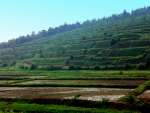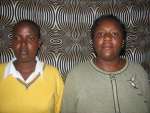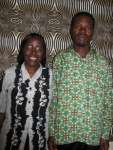Mukayiranga Verena & Mugisha Gabriel & Sharangabo Jean de Dieu
Mukayiranga Verena is speaking with two of her adopted sons, Mugisha Gabriel and Sharangabo Jean de Dieu. She tells stories of her struggles with discrimination between the different ethnicities and how there was nothing but love between all Rwandese people before the colonists arrived. Verena shares how she lived in paralyzing fear during the war saying “I could not sleep well; I would think that people would come to kill us.” Despite being traumatized by her experiences she overcame her fear and shares her story with her sons.
Kamanzi Jean Baptiste & Ngango Jean Bosco
Kamanzi Jean Baptiste tells the story of his life's hardships to his younger brother, Ngango Jean Bosco, who has not lived through such times as he has. Kamanzi Jean Baptiste shares with his brother details about his life such as how he joined the army because of abuse and hunger at home, or how he became handicapped and still decided to go to school at the age of 22 with peers who were 12 years old. Ngango Jean Bosco listens to his brother’s words and continues to ask more questions to which Kamanzi Jean Baptiste is happy to answer.
Kwizera Samuel & Igihozo Cindy Providence
Kwizera Samuel shares with his niece, Igihozo Cindy Providence, how people lived together in harmony regardless of ethnicity. All people in Rwanda had love for one another before the tragedy of the genocide. Emergency vehicles would not stop to check the ethnicity of a patient before taking them to the hospital. In fact, those riding the emergency vehicles would all be of different ethnicities in the first place. In those days, people helped one another.
Nsabimana Jean Pierre & Zaninka Scola
Zaninka Scola was born shortly after her father’s death and only got to know her mother for a short time before she died. In this story, her elder brother Nsabimana Jean Pierre shares with her all that she wants to know about their parents: their marriage, their values, their care for them as children. His message to her is partly summed up in a Rwandese proverb that means, ‘no one shall receive what they have not earned.’ He also passes to her the legacy given to him by their father that they must always share what they have with others.
Twahirwa Deborah & Tuyishimire Florence
When a large number of children were orphaned by the genocide, it became difficult for many of them to find people to replace their families and get advice from. Twahirwa Deborah tells Tuyishimire Florence the ways orphans can see love and comfort in the world so they can hope for a brighter future, and how all Rwandans must forget about their differences and become one family.
Ndiseguye Aloysia & Gatesi Charlotte
Ndiseguye Aloysia helps Gatesi Charlotte understand how to lead a productive and fulfilling life and reminds her to always ask for advice from older people. Ndiseguye Aloysia reminds her that children should be helped and treated with empathy rather than punished, and that being studious is the best way to avoid trouble. Importantly, boys and girls should respect each other and study together to encourage one another.
"To learn how to listen, to respect and to ask for advises, it is very good. If you are advised...you should feel that you are lucky." Ndiseguye Aloysia
Kaberuka Anatole & Mulima Ngautabana Yves
It is well known in Rwanda that ethnic tribes coexisted peacefully before the genocide. Kaberuka Anatole explains to his grandson Mulima Nyautabana Yves about how the colonial regime worked to turn tribes against one another, cultivating hatred and jealousy in order to maintain control and exploit Rwanda. In a history tale that begins before Belgian rule, Kaberuka Anatole shows how the colonial regime treated the country like playing a game of cards.
Kabandana Louis & Nkusi Faustin
Kabandana Louis and Nkusi Faustin have different reasons to explain why elders and youths no longer share stories, histories, and proverbs. Yet they also discover both sides might be much more willing to talk than they thought. They discuss the growing equality for women and how important it is to remember the past even if new ways might be better. Kabandana Louis talks of female soldiers, folklore fears, and the impact technology has on Rwandese oral culture.
Mujawiyera Josephine & Habineza Fidei
Habineza Fidei seeks the advice of his adoptive mother about how to plan a family, negotiate difficult situations with his new wife, and preserve important traditions in a changing world. Mujawiyera Josephine remembers being the most beloved of her father's children, and describes the neglect her siblings suffered as the family increased in size. She counsels her son only to have as many children as he can love fully and support financially.
Mukakayange Veronique & Muyisenge Onaan
Muyisenge Onaan wants to learn about his family history and the stories his parents passed down to his older sister, Mukakayange Veronique. Mukakayange Veronique recalls the loss of their mother in a violent bombing, finding a way to build a relationship through song, and forgiveness. By discussing the manner in which they personally survived hardship, Muyisenge Onaan and Mukakayange Veronique imagine solutions for a peaceful future for Rwanda.
"There is a proverb in Kinyarwanda which says 'A good neighbor is better than a distant relative'." Mukakayange Veronique












